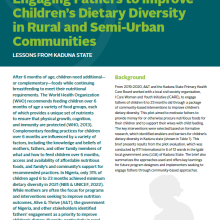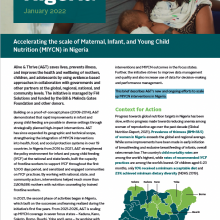Brief
Jul 11 2023

Engaging Fathers to Improve Children's Dietary Diversity in Rural and Semi-Urban Communities: Lessons from Kaduna State
From 2019-2020, A&T and the Kaduna State Primary Health Care Board worked with a local civil society organization, I Care Women and Youth Initiative (ICARE), to engage fathers of children 6 to 23 months old through a package of community-based interventions to improve children’s dietary diver
Brief
Mar 04 2022

Nigeria Country Brief
This brief describes A&T’s new and ongoing efforts to scale up MIYCN interventions in Nigeria.
Journal article
Feb 25 2020

Nutrition intervention using behavioral change communication without additional material inputs increased expenditures on key food groups in Bangladesh (Warren AM., 2020. Journal of Nutrition)
This article demonstrated that recipients in the Phase I intensive intervention, which provided interpersonal counseling, community mobilization, and mass media campaigns, mobilized additional resources to improve diets.
Journal article
Feb 11 2020

Suboptimal infant and young child feeding practices in rural Boucle du Mouhoun, Burkina Faso: Findings from a cross-sectional population-based survey (Sarrasat S., 2019. PLOS One)
Mothers in the rural Boucle de Mouhoun Region of Burkina Faso had low levels of knowledge of IYCF and practices, according to this study: 60% of children had the minimum meal frequency, while only 18% benefited from the minimum dietary diversity and 13% received minimum acceptable diet.


